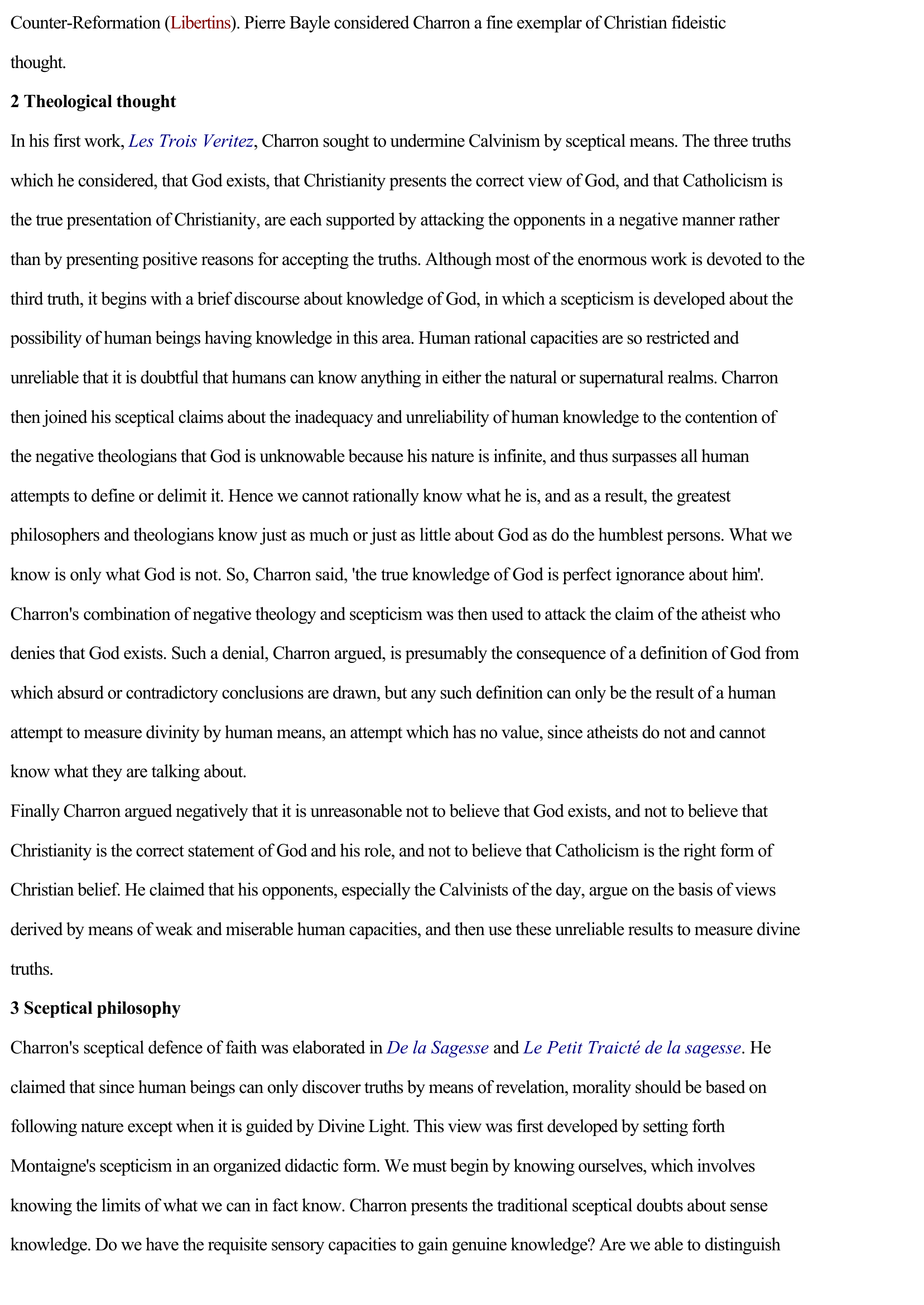Charron, Pierre
Publié le 22/02/2012
Extrait du document
«
Counter-Reformation ( Libertins ).
Pierre Bayle considered Charron a fine exemplar of Christian fideistic
thought.
2 Theological thought
In his first work, Les Trois Veritez , Charron sought to undermine Calvinism by sceptical means.
The three truths
which he considered, that God exists, that Christianity presents the correct view of God, and that Catholicism is
the true presentation of Christianity, are each supported by attacking the opponents in a negative manner rather
than by presenting positive reasons for accepting the truths.
Although most of the enormous work is devoted to the
third truth, it begins with a brief discourse about knowledge of God, in which a scepticism is developed about the
possibility of human beings having knowledge in this area.
Human rational capacities are so restricted and
unreliable that it is doubtful that humans can know anything in either the natural or supernatural realms.
Charron
then joined his sceptical claims about the inadequacy and unreliability of human knowledge to the contention of
the negative theologians that God is unknowable because his nature is infinite, and thus surpasses all human
attempts to define or delimit it.
Hence we cannot rationally know what he is, and as a result, the greatest
philosophers and theologians know just as much or just as little about God as do the humblest persons.
What we
know is only what God is not.
So, Charron said, 'the true knowledge of God is perfect ignorance about him' .
Charron's combination of negative theology and scepticism was then used to attack the claim of the atheist who
denies that God exists.
Such a denial, Charron argued, is presumably the consequence of a definition of God from
which absurd or contradictory conclusions are drawn, but any such definition can only be the result of a human
attempt to measure divinity by human means, an attempt which has no value, since atheists do not and cannot
know what they are talking about.
Finally Charron argued negatively that it is unreasonable not to believe that God exists, and not to believe that
Christianity is the correct statement of God and his role, and not to believe that Catholicism is the right form of
Christian belief.
He claimed that his opponents, especially the Calvinists of the day, argue on the basis of views
derived by means of weak and miserable human capacities, and then use these unreliable results to measure divine
truths.
3 Sceptical philosophy
Charron's sceptical defence of faith was elaborated in De la Sagesse and Le Petit Traicté de la sagesse .
He
claimed that since human beings can only discover truths by means of revelation, morality should be based on
following nature except when it is guided by Divine Light.
This view was first developed by setting forth
Montaigne's scepticism in an organized didactic form.
We must begin by knowing ourselves, which involves
knowing the limits of what we can in fact know.
Charron presents the traditional sceptical doubts about sense
knowledge.
Do we have the requisite sensory capacities to gain genuine knowledge? Are we able to distinguish.
»
↓↓↓ APERÇU DU DOCUMENT ↓↓↓
Liens utiles
- SAGESSE (De la) de Pierre Charron
- Charron, Pierre - philosophie.
- CHARRON Pierre : sa vie et son oeuvre
- CHARRON (Pierre)
- STOÏCIENS ET NÉO-STOÏCIENS: Juste Lipse, Guillaume du Vair, Pierre Charron

































